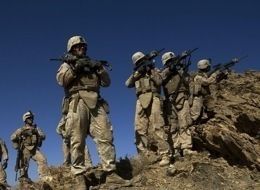
It is still not clear which strategy President Obama will adopt in Afghanistan. Meanwhile his allies are taking action: the Netherlands, Canada and Japan are all planning troop withdrawals.
While strategy in Afghanistan continues to be debated in America – more troops or less, protect civilians from the Taliban or attack al-Qaeda – it is also not yet clear which path Germany’s new coalition government will take. The FDP wants to examine all foreign deployments of German troops while Chancellor Angela Merkel’s CDU says it will stick with her plan to soldier on in Afghanistan, but that Afghanistan must eventually provide for its own security.
As long as the new government’s position remains vague, the longer the debate over Germany’s role will be determined by guilty consciences. Germans still have a feeling that they are not doing enough, that they are unwilling to fight and even that they have forgotten how to fight.
The German government has more or less successfully deflected this pressure but has not been successful in dispelling the shadow that lies over the German army’s Afghan involvement, namely the accusation that they are cowardly; they allow others to do the fighting for them while they hunker down comfortably in the safety of their fortified positions in relatively safe areas of Afghanistan.
Under these conditions, the German army’s act of calling in a NATO air strike on two fuel transporters in which dozens of civilians lost their lives in September looks like an overreaction to their long silence in the face of such charges.
Many Germans are reacting to these accusations with a mixture of self-remorse and see-I-told-you-so. What is missing, however, is a rational examination of the problem. A look at our alliance partners would be helpful. The Dutch parliament has just set a final date of autumn 2010 for the withdrawal of their 1,400 troops from Afghanistan. The Canadian parliament (Canadian troops remain the fourth largest contingent and have suffered very high casualties) announced their troops would be withdrawn in 2011. This week, the Japanese government announced they would end their logistical support for the Afghan war in January 2010.
Of course Japan’s contribution is limited to just two warships deployed to the Indian Ocean to assist in providing NATO troops with fuel. Nonetheless, Japan’s ultimatum gives further impetus to what amounts to an uncoordinated withdrawal of the western alliance, and further similar decisions may be expected. The Italians, for example, are already talking about a “transitional strategy” and it will not be long before they also announce their definite withdrawal date.
Those who follow these developments understand that Germany is not the only country to have doubts about the wisdom of the campaign. Many others share these concerns. When withdrawal is discussed in Germany, it is certainly not as if we would be going our own way.

Leave a Reply
You must be logged in to post a comment.